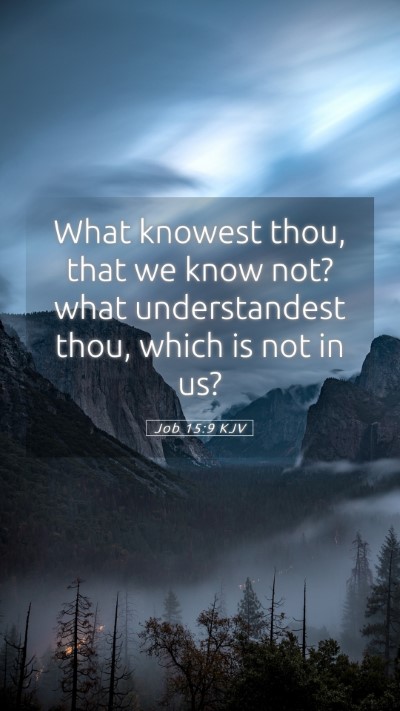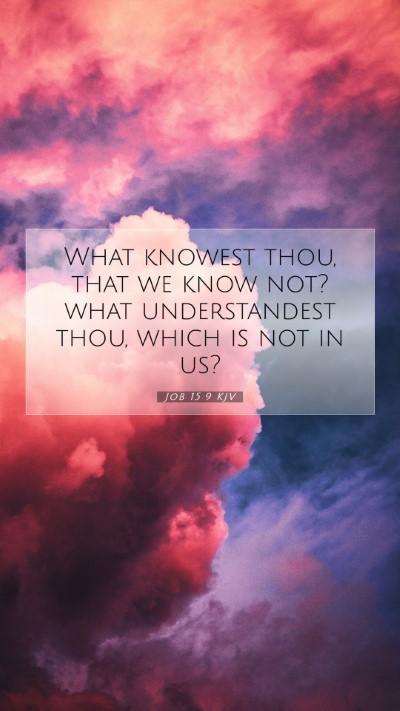Understanding Job 15:9
This verse is a part of Job's dialogue with his friend Eliphaz, who assertively claims superior understanding and wisdom. Job 15:9 encapsulates the essence of human limitations in knowledge and is a pivotal illustration of the tension between divine wisdom and human understanding.
Insights from Commentaries
-
Matthew Henry's Commentary:
Henry emphasizes that the essence of Eliphaz's upset is rooted in his misunderstanding of God's judgments. He points out that Eliphaz believes he possesses knowledge superior to Job's suffering. The verse implies that true wisdom is not merely intellectual accumulation but comes with a deep understanding of God's perspective.
-
Albert Barnes' Notes:
Barnes highlights the sarcastic undertone in Eliphaz’s speech. The rhetorical question serves to confront Job’s integrity and perceived ignorance about divine matters, questioning what unique insight Job has amidst his sufferings. This showcases the complex dialogue concerning the nature of wisdom and suffering.
-
Adam Clarke's Commentary:
Clarke discusses how the question aims to belittle Job; it suggests that Job's experience cannot bring forth any new understanding about God's ways. Clarke offers insights into the theological implications, suggesting that human experiences do not equate to divine wisdom, and cautions against assuming superiority over others in understanding divine matters.
Key Themes and Interpretations
This verse not only highlights the theme of wisdom versus ignorance but also the futility of human lip-service towards divine knowledge without true personal insight or understanding.
- Humility in Understanding: The verse serves as a reminder that no one fully grasps the mind of God, calling for humility in judgment.
- Importance of Experience: Job's responses throughout his ordeal indicate that wisdom is gained through suffering and experiences that cannot be shared or compared superficially.
- Challenging Assumptions: It challenges assumptions about who possesses true wisdom, often reminding readers that knowledge does not always translate to understanding.
Application in Daily Life
The verse invites readers to examine their assumptions about knowledge in relation to others, encouraging individuals to approach conversations with empathy and openness. It also challenges one to consider that understanding comes from experience and relationship with God.
Related Bible Cross References
- Proverbs 3:7 - "Do not be wise in your own eyes; fear the Lord and shun evil." This reference complements the theme of humility in understanding.
- Isaiah 55:8-9 - "For my thoughts are not your thoughts, neither are your ways my ways,” declares the Lord. This supports the assertion that God's wisdom is far beyond human comprehension.
- 1 Corinthians 1:25 - "For the foolishness of God is wiser than human wisdom, and the weakness of God is stronger than human strength." This verse parallels the sentiment of the limitation of human understanding.
Conclusion
Job 15:9 serves as a critical reflection on human wisdom and understanding in the grander scope of divine providence. As seen through the insights of various commentators, it provides a rich field for theological exploration and personal reflection, pertinent for Bible believers engaged in bible study insights and bible verse interpretations.


